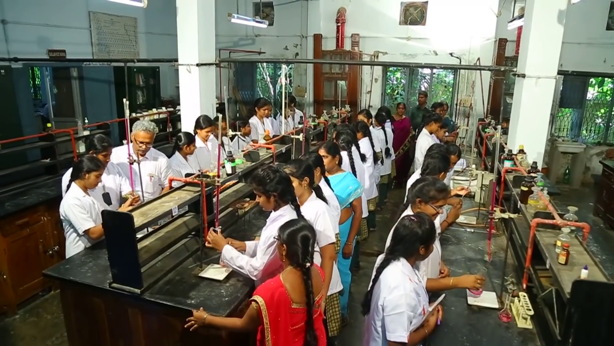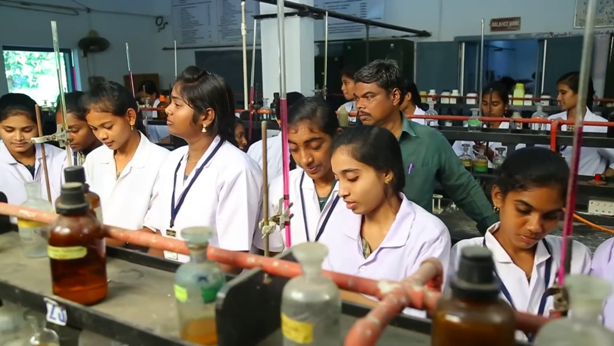| S.No | Name | Qualification | Experience in Years | Period (From-To) |
| 1. | Dr.M.Sunitha | M.Sc., M.Phil, Ph.D, | 20 | 2003-till date |
| 2. | Dr.Ch.V.V.Srinivas | M.Sc., Ph.D, | 38 | 1985-till date |
| 3. | Smt.V.B.T.Sundari | M.Sc., | 22 | 1999-till date |
| 4. | Smt.N.Swathi | M.Sc., | 08 | 2014-till date |
| 5. | Smt.P.N.L.Prasanna | M.Sc., | 04 | 2019-till date |
| 6. | Smt.N.S.V.Sravani | M.Sc., | 04 | 2019-till date |
- About Department
- Vision & Mission
- Courses / Programmes
- Sem-wise Syllabus
- Strengths and Achievements of Department
- Staff Details
- Student Admissions
- Results
- Publications, Patents & Awards
- Dept. meeting Minutes
- Best Practices
- Continuous Internal Assessment
- Student's Progression to Higher Education
- Student's Progression to Employment
- Departmental Activities
- Field Trips
- MOU's
About Department
The strength of the department is well qualified and experienced faculty and equipped with well-established laboratories.
Lab to School is the best practice initiated by the department to motivate the students towards social service through experiential learning and this also improves the presentation skills of the students. Preparation of House Hold Chemicals like Surf, cleaning powder, Soaps, Pain Balm, and Vaseline is our Departmental best practice. Sanitizer preparation and distribution is one significant practice adopted by the department during the pandemic with a motive to inculcate social responsibility among the students.
Student seminars, field trips, quiz programs, and student projects are regularly organized to make the students more interactive and enhance their academic performance. The department facilitates the students with ICT-enabled teaching through the four quadrants (Text Audio Video and question bank on the content). E-content is maintained on the college LMS portal which can be easily accessed by the students and enhance their knowledge.
The faculty constantly enriches their knowledge and gets exposure to the current advancements by participating in faculty development programs, refresher courses and registering in swayam online courses, etc.
The Department library is maintained through which students can be issued textbooks and reference books that add to their learned concepts in the classroom.
Vision & Mission
VISION:
Envisaging an innovative and globally competitive learning and research environment that promotes scientific curiosity, creativity, and societal benefit.
MISSION:
- To impart knowledge and skills to the students by providing innovative classroom instruction at undergraduate level and update curriculum.
- To meet the environmental and global related issues though chemical education and communicate the excitement of chemistry.
- To stand for a learner- centred, value based educational system.
STUDENT ADMISSIONS (PROGRAMME WISE)
| Academic Year | FIRST YEAR | SECOND YEAR | THIRD YEAR | ||||||
| MPC | CBZ EM | CBZ TM | MPC | CBZ EM | CBZ TM | MPC | CBZ EM | CBZ TM | |
| 2017-2018 | 23 | 51 | 27 | 15 | 40 | 22 | 10 | 27 | 23 |
| 2018-2019 | 23 | 49 | 16 | 17 | 42 | 18 | 15 | 47 | 17 |
| 2019-2020 | 33 | 47 | 35 | 34 | 43 | 14 | 17 | 37 | 19 |
| 2020-2021 | 33 | 43 | 12 | 26 | 40 | 26 | 20 | 46 | 38 |
| 2021-2022 | 21 | 67 | – | 19 | 45 | 31 | 27 | 42 | 26 |
| 2022-2023 | – | 59 | – | 21 | 67 | – | 19 | 45 | 31 |
Result Analysis
| Year | Class | Group | Appeared | Pass | Pass% |
| 2021-22 | III BSc | MPC&CBZ | 23 | 19 | 82 |
| 2020-21 | III BSc | MPC&CBZ | 36 | 31 | 86 |
| 2019-20 | III BSc | MPC&CBZ | 15 | 12 | 80 |
| 2018-19 | III BSc | MPC&CBZ | 23 | 20 | 87 |
| 2017-18 | III BSc | MPC&CBZ | 60 | 53 | 88.3 |
| Published By | Title of the Paper | Name of the Journal | Year of Publication | ISSN/ISBN |
|
Dr.M.Sunitha |
Greener One-pot Synthesis of Chromeno Oxazin and Oxazin Quinoline Derivatives and their Antibacterial Activity | International Journal of Advanced Engineering Research and Science (IJAERS) | 17-05-2022 | ISSN: 2349-6495(P) | 2456-1908(O) |
| Catalyst Free One-Pot Synthesis of Chromeno Quinolines and Their Antibacterial Activity | Scientific Research Publishing
Green and Sustainable Chemistry, |
17-07-2022 | ISSN Online: 2160-696X ISSN Print: 2160-6951 | |
| Visible Light Photocatalytic Degradation of Methylene Blue and Malachite Green Dyes
with BaWO4-Go Nano Composite |
International Journal of Environment, Agriculture and Biotechnology (IJEAB) | 2017 | ISSN: 2456-1878 | |
| Synthesis, Characterization and Visible Light Photocatalytic Degradation Study of Thiourea modified Nano Titania Composites | Journal of Applicable Chemistry (International Peer Reviewed Journal) | 01-07-2018 | ISSN: 2278-1862 | |
| Visible Light Photocatalytic Degradation of Methylene Blue and Malachite Green Dyes with CuWO 4 -GO Nano Composite | Scientific Research Modern Research in Catalysis Publishing | 01-07-2018 | 2168-4499 ISSN Print: 2168-4480 |
Continuous Assessment is a critical step in the learning process. It determines whether the learning objectives of the course have been met or not. In the past, only observation by the teacher was the main mode of assessment. But in the process of development of a system, there occurred various types of assessments that can be broadly classified as Formative Assessment and Summative Assessment. The former is continuous and is conducted during the teaching-learning process and the latter is to evaluate the student learning at the end of the semester. For Continuous Internal Evaluation/ Assessment our University has adopted the 75+25 Marks External and Internal Examination System. Our University conducts examinations at the end of each semester for both theory and practical sessions and for which Question Papers are prepared by the Controller of Examinations.
For the CIA all activities are divided into 4 categories.
1. Assignments 5 Marks
2. Project/Seminar/GD/ Role-plays/Quiz / Presentation 5 Marks
3. Attendance for Clean and Green Programme 5 Marks
4. Testing of Subject knowledge through Mid-term Exams 20+15 Marks
Total for 2 Mid Exams 50
CIA carried out in our college keeping in mind the words of Plutarch -“The Correct analogy for the mind is not a vessel that needs filling, but wood that needs igniting”. As we were in aided college from (20-21)that time we followed the guidelines of AKNU. We have to implement CIA from 2022-23 onwards as now we are in Govt. Service.
| Sno | Year | Activity |
| 1 | 2017-2018 | Click Here |
| 2 | 2018-2019 | Click Here |
| 3 | 2019-2020 | Click Here |
| 4 | 2020-2021 | Click Here |
| 5 | 2021-2022 | Click Here |
| 6 | 2022-2023 | Click Here |
Recent Posts
Categories
LASTEST NEWS
-
NATIONAL SCIENCE DAY
February 29, 2024 -
75th Republic Day Celebrations
January 27, 2024 -
77 INDEPENDENCE DAY CELEBRATIONS 2023
August 16, 2023 -
National Handloom Day Celebrations 07-08-2023
August 9, 2023 -
Guru Poornima Celebrations 2023
July 3, 2023 -
Inauguration of Certificate Course in Music
July 3, 2023 -
National Statistics Day 2023
July 1, 2023 -
World Olympic Day 2023
June 23, 2023
CATEGORIES
- Outreach (11)




Recent Comments